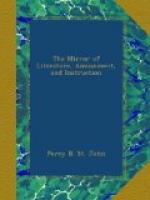The sense of death is most in apprehension.
But, is this fitting for the obituary of a comic actor? Yes, we reply, and as both are but occasions of appeal to the passions, we may think the death of a tragedian less striking than the former, since all tragedies end with death, and death in itself is but a scene of tragedy. Is any lament of Shakspeare’s heroes more touching than his apostrophe to the scull of Yorick, the King’s jester, the mad fellow that poured a flagon of Rhenish on the clown’s head: “a fellow of infinite jest; of most excellent fancy. Where be your gibes now? your gambols? your songs? your flashes of merriment, that were wont to set the table on a roar? Not one now to mock your own grinning? quite chap-fallen?”
Munden was the son of a poulterer in Brooke’s Market, Holborn, where he was born in the year 1758. His father died soon afterwards, leaving his widow with slender means, and Munden was thrust upon the world to seek his fortune at twelve years of age. He was placed in an apothecary’s shop, but soon left it for an attorney’s office. Perhaps, like Dr. Wolcot, he fancied the clinking of the pestle and mortar said “Kill ’em again! kill ’em again.” From the attorney’s office, he “fell off,” as Hamlet’s Ghost would say, to a law-stationer’s shop, and became “a hackney writer:” the technicality needs not explanation: to hack at anything is neither the road to fame nor a good meal. He was apprenticed in Chancery Lane: his master died and was succeeded by an older man, of the square-toed fraternity, who taxed Munden with being a Macaroni more than a tradesman. Munden, in consequence, parted from his master, and once more returned to the office of a solicitor. They who remember Munden, a staid-dressing man in later years, may smile at his early observance of the glass of fashion.




